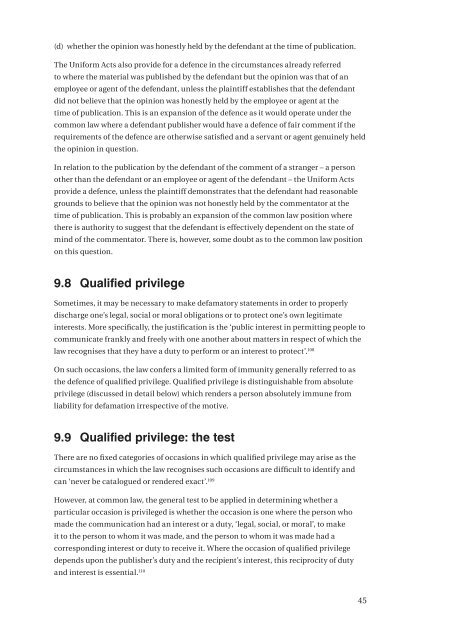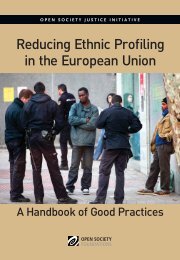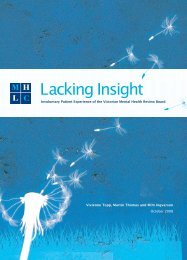Responding to the financial abuse of older people - Loddon ...
Responding to the financial abuse of older people - Loddon ...
Responding to the financial abuse of older people - Loddon ...
- No tags were found...
Create successful ePaper yourself
Turn your PDF publications into a flip-book with our unique Google optimized e-Paper software.
(d) whe<strong>the</strong>r <strong>the</strong> opinion was honestly held by <strong>the</strong> defendant at <strong>the</strong> time <strong>of</strong> publication.<br />
The Uniform Acts also provide for a defence in <strong>the</strong> circumstances already referred<br />
<strong>to</strong> where <strong>the</strong> material was published by <strong>the</strong> defendant but <strong>the</strong> opinion was that <strong>of</strong> an<br />
employee or agent <strong>of</strong> <strong>the</strong> defendant, unless <strong>the</strong> plaintiff establishes that <strong>the</strong> defendant<br />
did not believe that <strong>the</strong> opinion was honestly held by <strong>the</strong> employee or agent at <strong>the</strong><br />
time <strong>of</strong> publication. This is an expansion <strong>of</strong> <strong>the</strong> defence as it would operate under <strong>the</strong><br />
common law where a defendant publisher would have a defence <strong>of</strong> fair comment if <strong>the</strong><br />
requirements <strong>of</strong> <strong>the</strong> defence are o<strong>the</strong>rwise satisfied and a servant or agent genuinely held<br />
<strong>the</strong> opinion in question.<br />
In relation <strong>to</strong> <strong>the</strong> publication by <strong>the</strong> defendant <strong>of</strong> <strong>the</strong> comment <strong>of</strong> a stranger – a person<br />
o<strong>the</strong>r than <strong>the</strong> defendant or an employee or agent <strong>of</strong> <strong>the</strong> defendant – <strong>the</strong> Uniform Acts<br />
provide a defence, unless <strong>the</strong> plaintiff demonstrates that <strong>the</strong> defendant had reasonable<br />
grounds <strong>to</strong> believe that <strong>the</strong> opinion was not honestly held by <strong>the</strong> commenta<strong>to</strong>r at <strong>the</strong><br />
time <strong>of</strong> publication. This is probably an expansion <strong>of</strong> <strong>the</strong> common law position where<br />
<strong>the</strong>re is authority <strong>to</strong> suggest that <strong>the</strong> defendant is effectively dependent on <strong>the</strong> state <strong>of</strong><br />
mind <strong>of</strong> <strong>the</strong> commenta<strong>to</strong>r. There is, however, some doubt as <strong>to</strong> <strong>the</strong> common law position<br />
on this question.<br />
9.8 Qualified privilege<br />
Sometimes, it may be necessary <strong>to</strong> make defama<strong>to</strong>ry statements in order <strong>to</strong> properly<br />
discharge one’s legal, social or moral obligations or <strong>to</strong> protect one’s own legitimate<br />
interests. More specifically, <strong>the</strong> justification is <strong>the</strong> ‘public interest in permitting <strong>people</strong> <strong>to</strong><br />
communicate frankly and freely with one ano<strong>the</strong>r about matters in respect <strong>of</strong> which <strong>the</strong><br />
law recognises that <strong>the</strong>y have a duty <strong>to</strong> perform or an interest <strong>to</strong> protect’. 108<br />
On such occasions, <strong>the</strong> law confers a limited form <strong>of</strong> immunity generally referred <strong>to</strong> as<br />
<strong>the</strong> defence <strong>of</strong> qualified privilege. Qualified privilege is distinguishable from absolute<br />
privilege (discussed in detail below) which renders a person absolutely immune from<br />
liability for defamation irrespective <strong>of</strong> <strong>the</strong> motive.<br />
9.9 Qualified privilege: <strong>the</strong> test<br />
There are no fixed categories <strong>of</strong> occasions in which qualified privilege may arise as <strong>the</strong><br />
circumstances in which <strong>the</strong> law recognises such occasions are difficult <strong>to</strong> identify and<br />
can ‘never be catalogued or rendered exact’. 109<br />
However, at common law, <strong>the</strong> general test <strong>to</strong> be applied in determining whe<strong>the</strong>r a<br />
particular occasion is privileged is whe<strong>the</strong>r <strong>the</strong> occasion is one where <strong>the</strong> person who<br />
made <strong>the</strong> communication had an interest or a duty, ‘legal, social, or moral’, <strong>to</strong> make<br />
it <strong>to</strong> <strong>the</strong> person <strong>to</strong> whom it was made, and <strong>the</strong> person <strong>to</strong> whom it was made had a<br />
corresponding interest or duty <strong>to</strong> receive it. Where <strong>the</strong> occasion <strong>of</strong> qualified privilege<br />
depends upon <strong>the</strong> publisher’s duty and <strong>the</strong> recipient’s interest, this reciprocity <strong>of</strong> duty<br />
and interest is essential. 110<br />
45
















